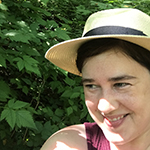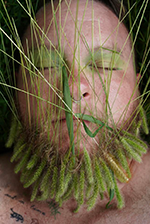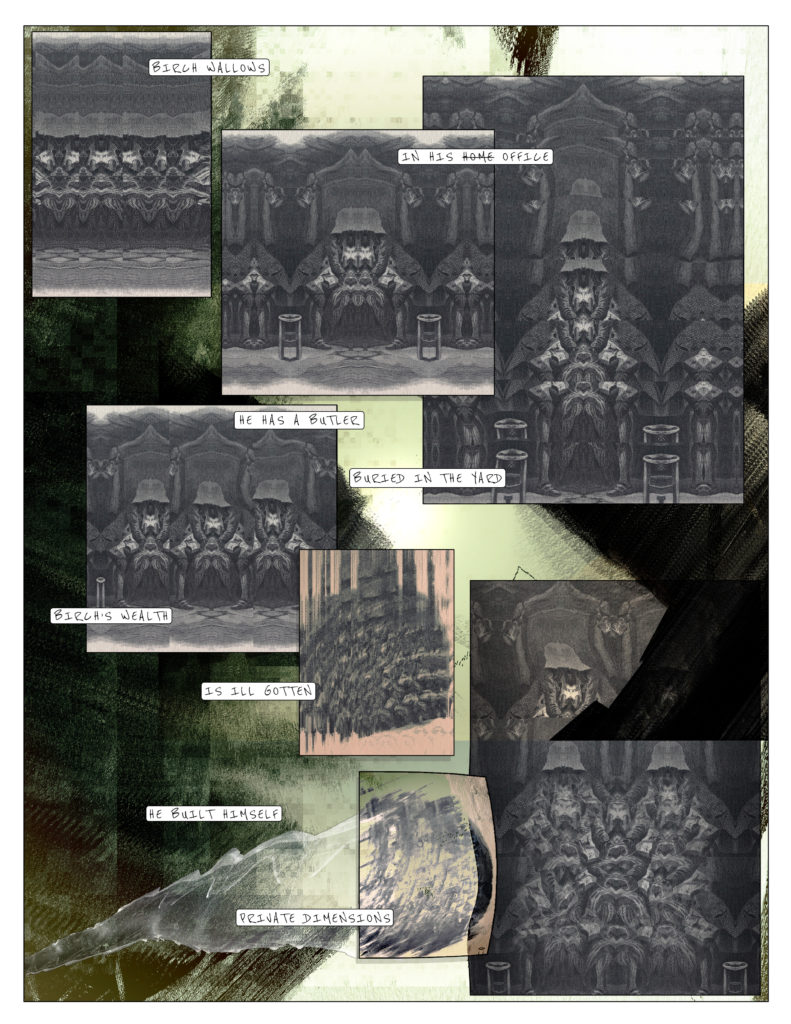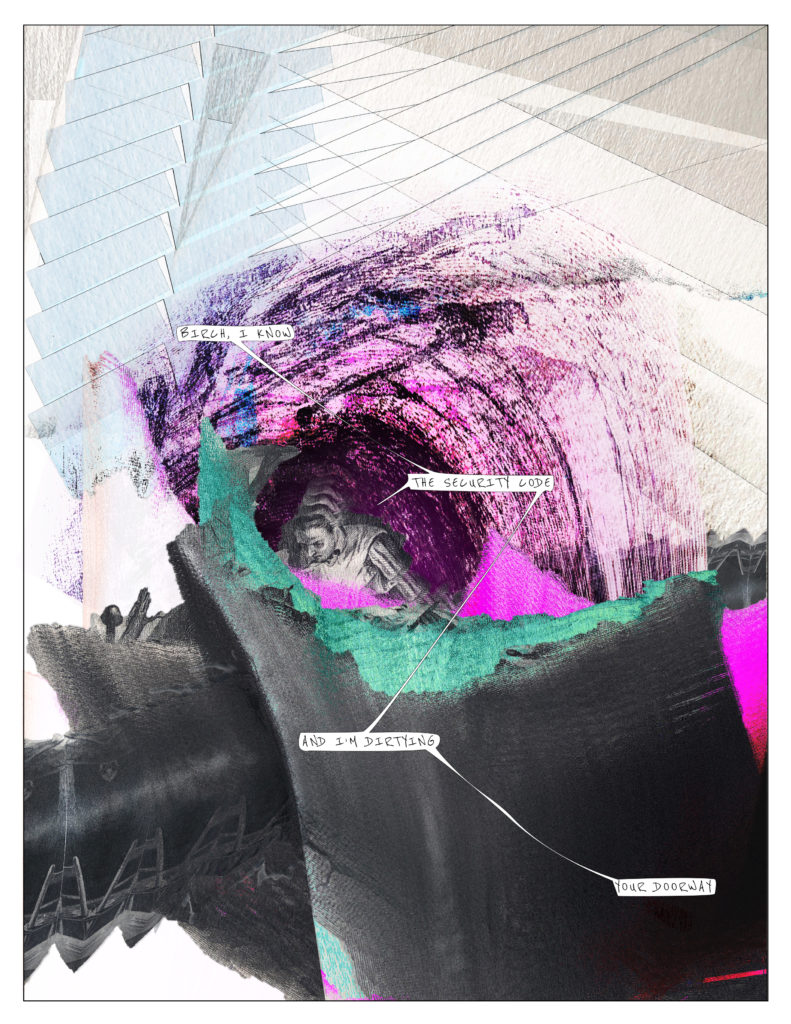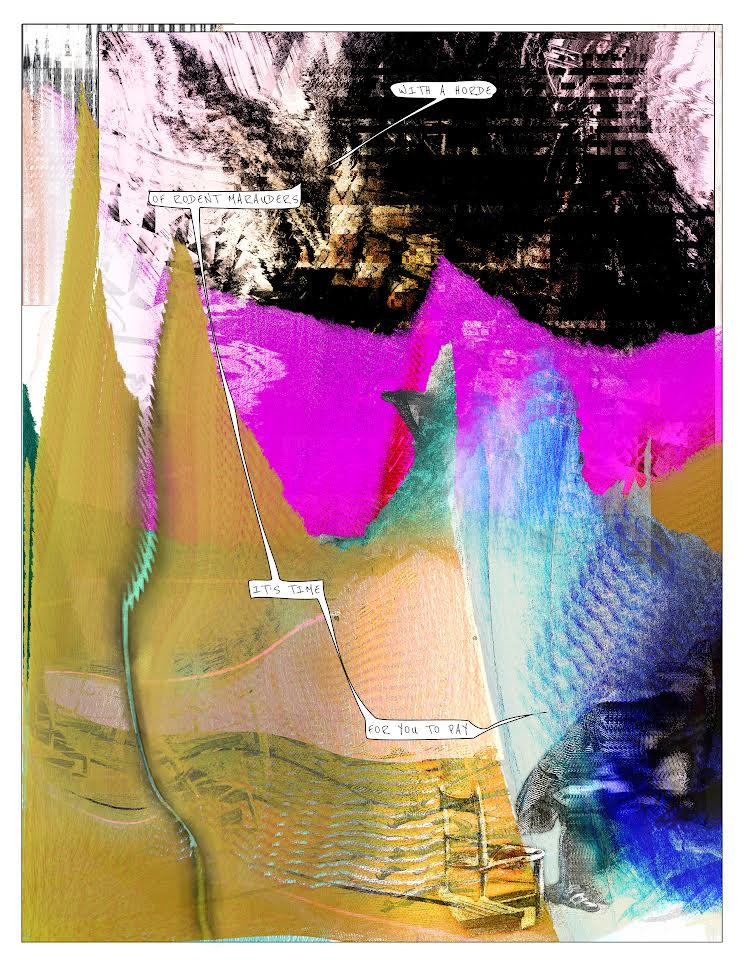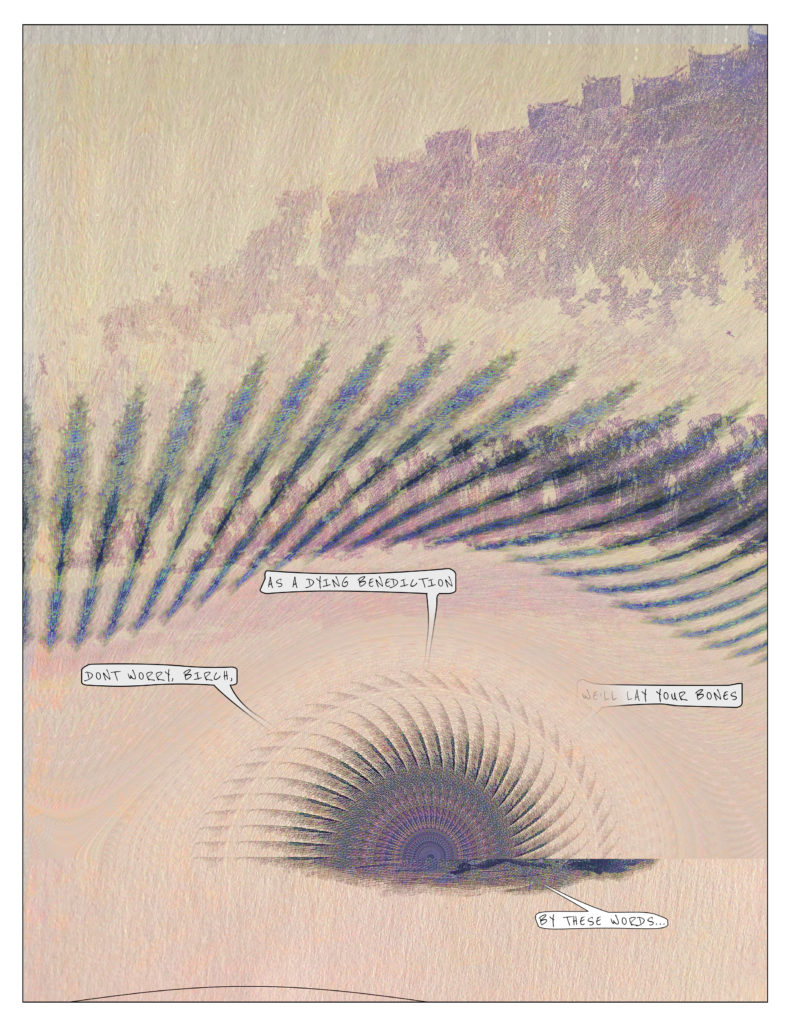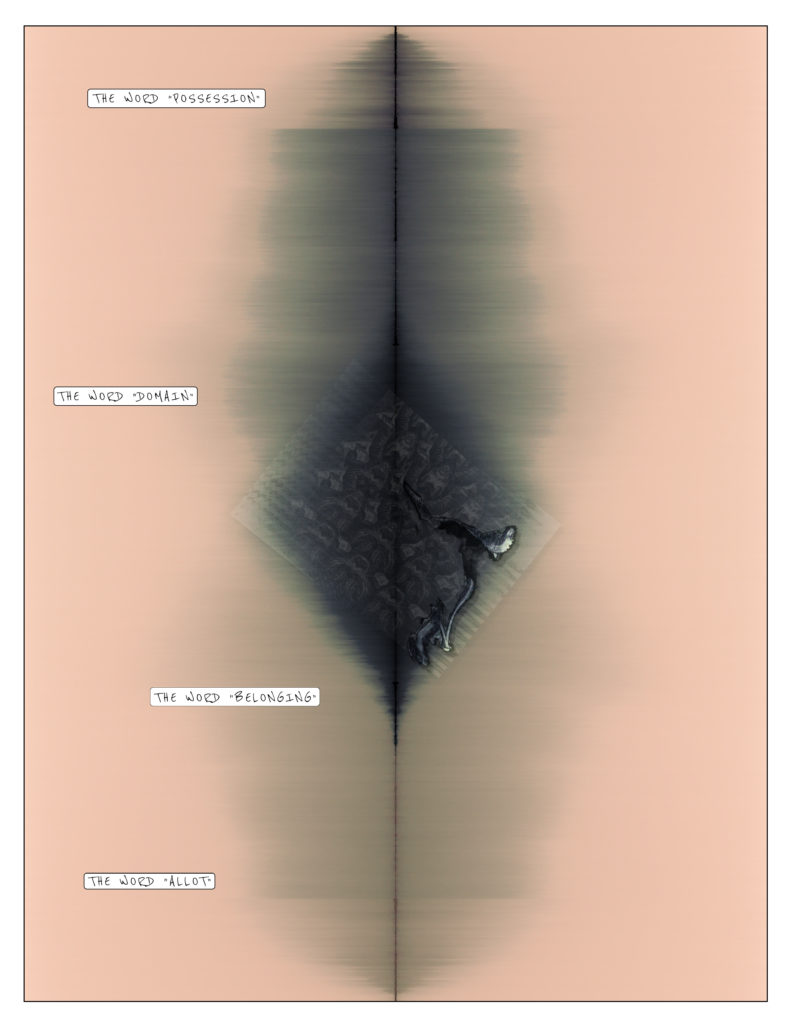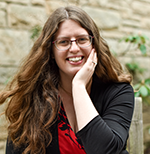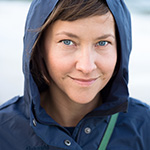from Ice People (Lud. Z grenlandzkiej wyspy)
The journey to Uummannaq takes thirty-three hours and twelve minutes. The plane from Copenhagen flies to Kangerlussuaq, Greenland’s biggest airport, which is both a hub for arrivals and a waiting area for those travelling farther afield. In Kangerlussuaq, a windless -28ºC greets you with a slap on the cheeks, and the icy sun stamps them red.
Greenland, or Kalaallit Nunaat (‘land of the Greenlanders’ – kalaaleq means Greenlander), is politically part of Europe, but geographically part of North America. The world’s largest island, eighty percent covered in ice and inhabited by just over 56,000 people, is divided into five municipalities: Sermersooq (‘place of much ice’), Qeqqata (‘the Centre’), Kujalleq (‘the South’), Qeqertalik (‘the one with islands’), and Avannaata (‘the North’), where Uummannaq is located. Avannaata has an area of over 520,000 square kilometres and a population big enough – at just over 10,000 – that most of the benches in the waiting room and outside the small airport are occupied. By the entrance there’s a sign showing how long it takes to reach various places. Ten hours to Tokyo, five hours forty minutes to Rome, just three and a quarter hours to the North Pole. Given that the shape of Greenland is said to resemble a polar bear, from the thighbone in Kangerlussuaq to the front right paw in Uummannaq it’s only four hundred kilometres in a straight line, even though the trip takes twenty hours.
The helicopter to Uummannaq accounts for the last twelve minutes.
In the queue to board I meet Ann, the director of the children’s home, who suggests we stick together. A few hours later I’m picking up scattered children’s shoes, and at nightfall the moon is the only thing I recognise in the landscape outside the window.
*
No one here has been waiting for you and they probably won’t miss you either.
You’re just one of the many people they encounter for short periods of time, so they don’t get too attached.
Don’t you get attached either, because you’ll hurt both them and yourself.
Sit down to eat when the others sit down.
Get up when everyone’s finished eating.
We’re hiring you because we’ll be able to send the children on holiday with the money we save.
Don’t forget, you can’t be on your own with them.
And write, but not about our children.
End of health and safety briefing.
*
Following the snowstorm that cut Uummannaq off from the rest of Greenland for two days, Karin, a Danish teacher, arrives on the island. It’s the day of the funeral for a teenager who killed himself a few days before. Karin was his caseworker for two years at the children’s home in Tasiilaq, eastern Greenland, where the boy had been sent from Uummannaq due to concerns about his mother.
Everyone knew him here, so the children’s home hosts the kaffemik, the traditional gathering for any occasion, attended by everyone in the town. The tables are laden with Greenlandic food – most importantly, mattak, raw whale skin as hard as cartilage, cut into cubes or sliced directly from the carcass. Mattak is rich in vitamin C, which is why there’s no history of scurvy in this part of the world. Dried whale and seal meat and all kinds of fish are also served, everything sprinkled copiously with salty Knorr flavouring and washed down with Coca-Cola or Faxe Kondi, the Danish equivalent of Sprite. Alongside the meats, a variety of cakes and sweets are laid out. The most important thing is that there’s a lavish spread, enough for everyone. The door is open, no need to knock or announce your arrival. The kaffemik lasts long enough for everyone to show their face. You can stay as long as you want. Some come for a few hours, others have barely touched the food before they’re saying goodbye. There’s no obligation to talk to the person sitting next to you. They say it’s impolite to impose yourself on your neighbour, even if all you’re doing is introducing yourself. To make it easier to find the right address (the buildings in Uummannaq are numbered not according to their position on the street, but the order in which they were built), flags are hoisted outside the house hosting the gathering. White and red with a circle of inverse colours in the middle, symbolising the sun – white and absent in the winter, red and ever-present in the summer. Greenlanders have only had their own flag since 1985, but its colours still reference the many years of Danish rule. The flagpoles are taller than the trees here.
During the kaffemik in sky-blue house number 1451, Karin listens to the musical performance with her head buried in her arms. A little while later, she’s perched in the bedding storage room, where we can talk in peace. She’s thirty years old. She talks in a whisper, but not so that no one can hear her. It’s more of a habit that everyone picks up after being in this part of the world for a long time.
*
“Lots of my patients end their lives by suicide. In psychiatry there’s a difference between those who threaten to kill themselves and those who just do it. People who are suicidal don’t ask for help. We get the most cases on Fridays and Saturdays,” says Henrik, one of two doctors in the local hospital, which has seventeen beds.
According to Greenland’s main newspaper ‘Sermitsiaq’, forty-seven people took their own lives in Greenland in 2016, ten more than in 2015 (in 1987, there were a record sixty-nine suicides). Thirty-five were male and twelve were female. The fact that increasing numbers of young people, especially men and boys, are killing themselves is a cause for concern. Half the people who died by suicide in Greenland in 2016 were between the ages of ten and thirty. It is said that the longstanding division of gender roles requires men to be indomitable and brave, and not to show their feelings, so many choose a solution that gets the attention of their loved ones, at least momentarily. “Men are like puppies that have slept on the ice since birth,” I hear as soon as I arrive. “If they survive, they stand a chance in life.” Henrik and I met at the kaffemik on the day of the funeral. He was on duty when the boy shot himself. In his free time, the doctor is a musician, so he played the accordion at the wake.
In mid-March, the night begins to move south, and in the late evening the sun projects silent films on the icebergs. The birds are already flying north, but it’ll be at least another two weeks before they arrive here. Beyond Henrik’s windows the white sea stretches to the horizon; a taxi drives along it in one direction, two scooters in the other. The doctor remembers a time when only dog sleds traversed the ice.
“Growing up in Uummannaq was the most important thing that’s happened in my life. I graduated in medicine for the sole purpose of returning here,” he tells me. “My father was a doctor too, that’s why we were living here. It was 1962. I was eight years old.”
Henrik is now a well-groomed sixty-three. We speak in Norwegian.
“At school we were split into Danish-speaking and Greenlandic-speaking classes. Our class had six pupils, theirs had twice as many. At home we had a Greenlandic kiffaq, a maid who looked after me and my siblings. We made friends with Greenlanders, we wore Greenlandic fur clothing, we spoke Greenlandic, but even when we were young, we could already see big differences between us. We lived practically the same as people in Denmark, in big houses with running water, while our friends were crammed into small houses, which were certainly warmer than ours because of the coal stoves in the middle, but you couldn’t live like that for long.”
Henrik is sitting on the sofa in a rented house, two blocks from the children’s home. There are no particular comforts here – the furniture is worn, the walls grey, the linoleum slippery. It’s clear he’s made himself at home here over the past year, because neither the dust nor the dirty windows bother him.
“Why did your homes have fences?” I ask.
“It was protection from the dogs. They’d sometimes kill children who fell over, so our parents were terrified for us, especially since a neighbour’s child had actually been torn to pieces. We respected the dogs out of fear. Whenever we went somewhere new, we’d carry a stone with us. We’d throw it if they came too close.”
Henrik’s stories are accompanied by long, drawn-out howls. Just a few decades ago, every family in Uummannaq had dogs. Nowadays, for the 1,300 people there are around 1,500 dogs, and that number is falling. Greenland is a modern country; yet it’s clear when you look out the window that the island is far from the established centre of the world, so transport has to pick up pace too. The relationship between the size of your sled dog team and your social status still holds in the far north. A thousand kilometres south things are different, even though the children still learn to mush from a young age, and it’s common to see youngsters running around the streets of Uummannaq swishing sealskin whips.
Even more common are the brown circles in the snow, trampled down at chain’s length. On the periphery of each circle several layers of frozen dog poo have accumulated, the contents of their guts on display. The smaller piles closer, the larger ones further from the dog’s nose. The excreted dry food, the urine and the dogs’ fur are all the same shade of rotten hay. The dogs gnaw away at these remnants methodically, though it’s unclear what system they’re implementing – fresh first, or frozen.
Nothing is wasted here.
The dogs have kennels on the land. The ones that pull sleds spend a few months a year out on the ice. They establish a hierarchy amongst themselves by force, but they submit to the humans. That’s how it is here. Greenlanders only give names to selected dogs. Dog sledding is the traditional way of travelling off-road, because the animals alert people to polar bears, are resistant to cold and hunger, and if necessary, they can be used as food themselves. From the beginning of my time in Uummannaq, I’m told that these close relatives of the wolf are work tools, not friends. Nobody lives an easy life here; nature is stripped of all sentimental attachment, towards both animals and people.
And everything is done for a reason.
The fact that aggressive puppies are killed because they won’t run well in the sled dog team. Just like any team, no one – including the humans – can be scared of the other members.
The fact that the hierarchy between man and dog is established by force. But if a kick needs to be dealt, it’s aimed at the ribs rather than the flesh, because the dog has to be healthy and in good shape.
The fact that the dogs are driven using a whip. It’s cracked on one side to turn the sled in the opposite direction.
The fact that there are no kennels on the ice, so the dogs will grow good quality fur and survive the winter. And the fact that when they die, their fur is used to make trousers or gloves.
And also the fact that dead dogs are either burned or dumped in the rubbish.
The dogs’ whines, the only sound on an island frozen in a silent sea, bore into my head and cause physical pain. It gets to me the most at night, after waking suddenly, or just before falling asleep. In the howls I can hear the crying of old people or untuned instruments. After yet another night spent with my ears pricked, an idea comes to mind: the fishing blowholes that riddle the sea. Diameter too small for a person, but a dog would fit.
“The barking is the sound of my childhood. The dogs don’t howl out of hunger anymore,” explains Henrik. “Back then they were always hungry, and they ate each other. If you had a puppy, you had to keep it in a pen, because if you forgot to close your gate the adult dogs would get in straight away and kill it. We had dogs as well. Everyone did. My father would drive the dog sled to patients in the neighbouring villages. I remember the moment we had to leave. I can barely talk about it, even today. I’d rather have died than return to Denmark,” he recalls.
After the family’s return, they settled in an upscale district on the outskirts of Copenhagen. Henrik remembers overhearing adults’ conversations in which Greenlanders were referred to as primitive, lazy and intellectually disabled.
“To make matters worse, I ended up in a Danish school with a thousand children. It was all control and discipline – three minutes for this, two for that. We had to walk in pairs, hand-in-hand on the flat pavement, and watch out for cars. I was a bit too perverse for my peers,” he admits with a laugh. “In Denmark everything was stuffy, but in Greenland you grew up around sex. My best friend and I always used to lie down together, studying our penises, and that seemed completely natural to me. The Greenlander way of thinking was simple, the same as it is today. Here, sex is like food, it’s spoken about with no unnecessary tension, it’s practised openly. My friends didn’t understand who I was, and I didn’t understand their way of thinking. At school they were always talking about football or TV programmes, but in Uummannaq there was no TV and we didn’t play football.”
*
“The essence of our life is chaos,” says Ann the next day. “If you want to adapt, be patient and treat the constant changes as an attempt to live the Greenlandic way. Nobody grows attached to places here, people have always been ready to move on.” She hands me the keys to the house I’ll be living in. It’s the third this week. “Oh, and the fridge is full.”
Since the session with Lars, the Danish alternative therapy expert who helped me untangle some of my behaviour patterns and shed some light on my childhood diagnosis, she keeps checking to make sure I’m not hungry. She has diabetes too, she knows what to watch out for. The key ring says number eleven. It must be one of the old houses in the centre. When we get there, I discover it’s the one with two doors. The key fits the Greenlander entrance, but after clearing the snow, it turns out the door is unlocked.
The yellow house with green shutters is both elegant and neglected. The owner travels often, so when he’s away he rents it out to those in need of somewhere to stay, most of whom won’t return here. They leave the toilet blocked and mould in the fridge. The fence surrounding the building is tall; you can’t see the interior of the property, nor the plastic bags strewn in front of the entrance, ignored by the rubbish collectors. The decorations on the rafters evoke a ship that was due to sail further north but got stuck in the ice. From the stern you enter the kitchen and defunct laundry room, and from the bow you reach a living room the size of two Greenlandic dugouts. The upstairs corridor is lined with musty carpet, a row of colourless furniture against the wall. The wardrobes are empty, there’s no clean bedding, only slept-in sheets smelling of greasy hair and insomnia. The corridor leads to two bedrooms. In the first, the floorboards creak in the corners, there’s a scattering of withered dead flies, and a sturdy hook hangs above the bed. In the second, there’s a door to a bathroom with a bathtub, where insects awoken by the sun are beating against the window with a view over the chains and dogs in the distance.
Time probably stopped in this house just as the Danish doctor’s son was developing the restlessness that would last him a lifetime. Downstairs I find boxes filled with furniture, quotes about happiness and a flat screen TV.
I watch the Sunday summary of the week’s news on KNR, in Greenlandic with Danish subtitles.
Politics: The local government election campaign is underway; after the main news there will be a debate between representatives of the major parties.
Environment: The polar bears have arrived. Three have been killed in the last week.
Culture: Greenlandic artist Julie Hardenberg has presented two new pieces – a Greenlandic flag covered in fair hair and a Danish flag covered in black hair – which have provoked a lively discussion about relations between the two nations.
Society: According to the latest report, there has been no improvement in youth welfare. Parents are still abusing alcohol and hashish. The Minister for Children spent a month in Kujalleq district and has expressed concern. She is recommending the equal treatment of youngsters from urban and rural backgrounds.
Health service: An increasing number of complaints are being made by patients regarding the lack of specialists and unsuitable medicines available in the hospitals.
Weather: Warmest in the south (-7ºC), coldest in the north (-28ºC).
Adverts: Fashionable glasses, eyelash extensions, a helpline for victims of domestic violence (‘Violence doesn’t solve problems. Violence creates problems. We’ll help you solve them. Give us a call’), and a springtime campaign for Air Greenland with a competition entitled Takuss, meaning ‘see you’.
In the evening, when the red rays of the sun are still illuminating the heart-shaped mountain, the lights come on in town. Through the kitchen window I can see boys playing football in the car park in front of Pilersuisoq grocery store. The pitch is white and slippery, the ball green, the players are wearing trainers and no gloves and shooting into a makeshift Euro Pallet goal. The thermometer on the window shows -22ºC. Every now and then, a car cuts across the pitch from the petrol station towards the two fuel pumps, or some men appear offside carrying canisters for scooter fuel. In the morning they’ll open up the shop, where only three buttons work on the produce weighing scales: white and red onions and potatoes. Within a few weeks, even those vegetables will run out.
I wonder what former tenants saw from here. Maybe building number one, which is nowhere to be found, was where the shop is now? Was my predecessor only warm from the knees up too? Based on what Henrik said, homes were heated with coal and there wasn’t enough heat for the whole building. As I watch a hazelnut rolling across the floor, I wonder if the house was uneven from the start or grew contorted because of the permafrost and irregular occupancy. Who has spent more time here, Greenlanders or Danes? What’s the purpose of the window in the wall that looks like a post hole, and what used to hang on the hook upstairs? My train of thought is interrupted by the football thudding against the wall. I run outside to give it back, the boys return to their game without a word, and I return to heating water, because the hot water from the tap was only enough to cover the bottom of the bathtub. Five saucepans later, lying in the tub, I can hear the ball bouncing off the walls repeatedly, but I’ve left the gate open.
Translator’s Note:
In the spring of 2017, Ilona Wiśniewska, a Polish writer, reporter and photographer, spent three months living in Uummannaq, a small town on the central-western coast of Greenland. Ice People is a work of literary reportage based on her time there, a riveting account of the people she met and what they taught her about Greenland, and about herself.
The basis for Wiśniewska’s trip is a volunteer placement at a children’s home in Uummannaq. With a population of around 1,300 people, Uummannaq is situated on a small, rocky island just off the coast of the mainland, separated by a strip of sea that freezes over during the winter. The scene is set with a description of the two springs that residents recognise annually – the first spring, when the temperature rises to -20ºC, is when the sun returns. The second spring is when the ice melts and the sea returns.
In a poetic and reflective manner, Wiśniewska recounts snippets of day-to-day life, exploring both the common and individual viewpoints and beliefs of the islanders, as well as broader topics, such as the importance of nature and the various socio-political challenges of life in the region, including the repercussions of Greenland’s colonisation by Denmark beginning in the 18th century.
The poignancy of the stories reported in this book is enhanced by the introspective nature of the author, which comes through in her descriptions of others, and of herself. Several times throughout the book, Wiśniewska jumps to a point in the future, usually to describe an occasion when she meets one of her friends from Uummannaq again after she’s left. She uses this ‘time travelling’ technique to reflect on the most salient aspects and lessons she took from her time in Greenland. Near the end of her stay, as the temperature warms, she contemplates the fact that the thinner the ice gets, the more notes she has for her book, and yet the less she is able to write.
Translating this excerpt of Wiśniewska’s book was a real joy, a creative tightrope walk of grappling with the author’s sparse, succinct language while seeking out suitable formulations to faithfully represent her poetic descriptions. The Polish text is peppered with Kalaallisut words and phrases that embellish the images and scenarios she recounts, and it felt only right to retain these terms in the English translation.
Few literary reportage books are written about Greenland, and the majority of those that are focus on the ice, the wilderness, climate change and other ‘bleak’ aspects of this region. Without overlooking these topics, Wiśniewska’s account very much highlights the warmth, community-mindedness and positive outlooks of the people she meets. Her subtle descriptions of the experiences and conversations she shares with co-workers, locals and other foreigners living in the town offer the reader a way into the mindset, values and traditions of people in this part of the world and a fascinating glimpse of life in a society and climate that for many people will be both unfamiliar and unimaginable.
This translation has been made possible by funding from the Polish Book Institute’s Sample Translations Programme.
Ilona Wiśniewska is an author, reporter, and photographer. She was born in southern Poland and currently lives in northern Norway. Ice People is her third reportage book set in Northern Europe. It was nominated for the prestigious Ryszard Kapuściński Award for Literary Reportage in 2018 and awarded the Mayor of Lublin’s Crystal Card for Polish Reportage in 2019.
Kate Webster is a translator of literature from Polish to English. Her translations include For Life by Marta Kisiel (in The Big Book of Modern Fantasy, 2019) and The Map by Barbara Sadurska (forthcoming, 2022). She is based in London.
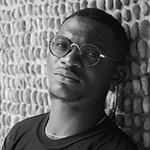

 BACK TO ISSUE
BACK TO ISSUE
